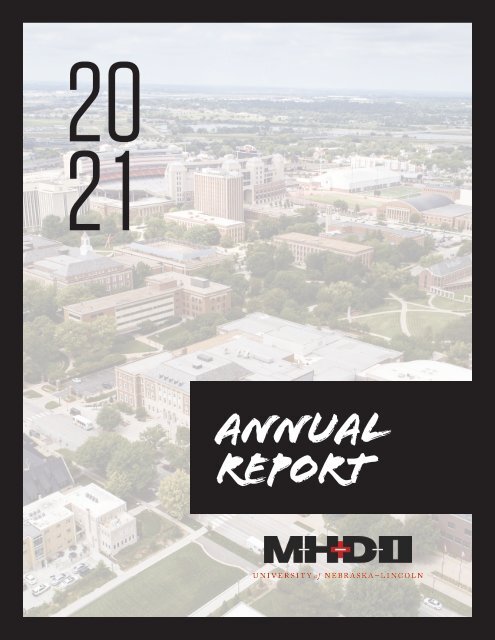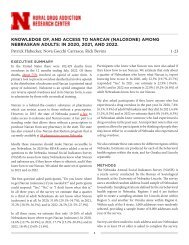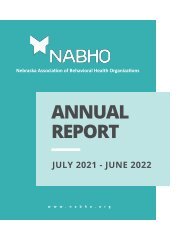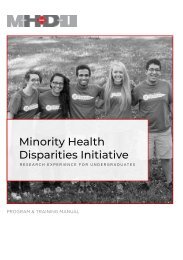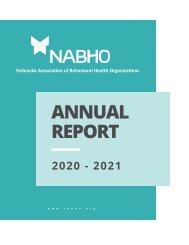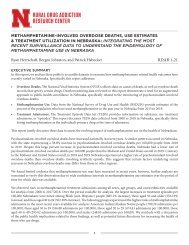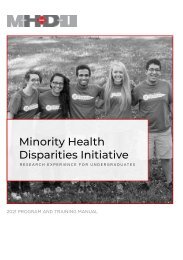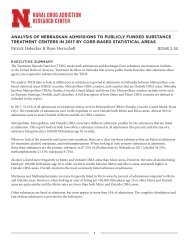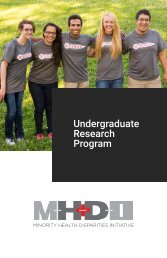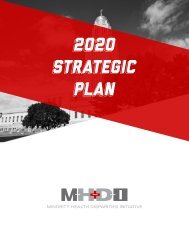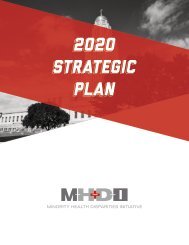2021 MHDI Annual Report
Create successful ePaper yourself
Turn your PDF publications into a flip-book with our unique Google optimized e-Paper software.
20<br />
21<br />
ANNUAL<br />
REPORT
table of<br />
contents
01 - 02<br />
03 - 06<br />
MESSAGE FROM<br />
THE TEAM<br />
OUR TEAM<br />
07 - 10<br />
11 - 15<br />
OUR MISSION<br />
ENGAGEMENT<br />
16 - 23<br />
24 - 25<br />
RESEARCH<br />
COMMUNITY<br />
IMPACT
MESSAGE FROM<br />
THE TEAM<br />
<strong>2021</strong> <strong>MHDI</strong> ANNUAL REPORT 4
A Letter From the Directors:<br />
Much like 2020, this year was a challenge for so many organizations and <strong>MHDI</strong> was no exception. We recognize the<br />
heartbreak and difficulties faced by the communities we serve. The COVID-19 pandemic and its spiderweb of related<br />
effects continue to remind us of all the manifold ways health equity remains an elusive goal. Within that context, our<br />
incredible staff, faculty, and students have continued to rise to meet these challenges through the great work that<br />
they do. We have continued to support community-based health research needs, implement new ways of improving<br />
health equity, and train the next generation of health equity scholars. As Co-Directors to our <strong>MHDI</strong> members, we see<br />
your contributions and we thank you for all of this hard work under such trying circumstances. This report outlines<br />
all of the great things that you have done, but we know no summary can fully articulate the emotional, physical, and<br />
mental labor you have given to our campus, city, state, and global communities.<br />
The past year also brought enormous opportunities. <strong>MHDI</strong> continues to grow, having added two new core faculty<br />
members who expand our expertise and enrich existing areas of focus. We welcome Ciera Kirkpatrick from Journal<br />
and Mass Communications, and Katie Edwards from the Center for Children, Youth, Families, and Schools. We have<br />
also seen the release of UNL’s Grand Challenges, which we have actively helped to shape. Trey helped lead writing<br />
for the focus of the Health Equity aim and shape its implementation and one of our Leadership Council members,<br />
Jordan Soliz helped spearhead and write the Anti-Racism and and Racial Equity theme. The Grand Challenges<br />
structure will bring new opportunities that can help expand the outlines of <strong>MHDI</strong>’s footprint. We look forward to<br />
helping brainstorm and coordinate proposals. We also hope to leverage this as an opportunity for transformational<br />
change for <strong>MHDI</strong> and health equity research overall at UNL.<br />
We are incredibly well positioned to take the “next step” with the Grand Challenges because of all of the great work<br />
done by our faculty to deepen our ties within the community. This work is reflected in the number of grants submitted<br />
and awarded. It was only three years ago that our team birthed the Rural Drug Addiction Research Center, which<br />
now operates independently. Reflecting on that journey, we look forward to creating more opportunities to address<br />
health equity of similar magnitude, whether through the Grand Challenges or other avenues. To support this, we will<br />
be inviting health equity leaders to visit <strong>MHDI</strong> to help us continue evolving our roadmap to success. Similarly, we will<br />
visit other centers to further clarify our vision of the eventual center we want to become. We have full confidence in<br />
our ability to reach these goals because of the wonderful team we have behind us.<br />
Sincerely,<br />
Trey Andrews, PhD<br />
Rick Bevins, PhD<br />
<strong>MHDI</strong> Co-Directors<br />
<strong>2021</strong> <strong>MHDI</strong> ANNUAL REPORT 2
OUR TEAM
LEADERSHIP TEAM<br />
<strong>MHDI</strong> is directed by Dr. Rick Bevins and Dr. Trey Andrews, is coordinated by Kim Gocchi Carrasco, and draws on<br />
support from Devan Crawford for grant support, Kali Patterson for administrative and event support, and Halley<br />
Horne for communications support. Over the past year and a half, the <strong>MHDI</strong> Leadership Team has enacted several<br />
structural changes to <strong>MHDI</strong> to enhance its position and clarify its mission. Some of these activities have taken place<br />
sporadically in the past, but the new structure is intended to ensure follow through and capacity building so that<br />
<strong>MHDI</strong> may plan ambitiously for its future. You can read more about these structural changes in the subsections on<br />
the following pages.<br />
RICK BEVINS<br />
Founder & Director<br />
TREY ANDREWS<br />
Co-Director<br />
KIM GOCCHI CARRASCO<br />
Coordinator<br />
DEVAN CRAWFORD<br />
Grant Support<br />
KALI PATTERSON<br />
Administrative Coordinator<br />
HALLEY HORNE<br />
Communications Assistant<br />
<strong>2021</strong> <strong>MHDI</strong> ANNUAL REPORT 4
LEADERSHIP COUNCIL<br />
In 2020, the <strong>MHDI</strong> formed a new Leadership Council with seven area leaders based around areas of expertise for<br />
<strong>MHDI</strong> and UNL health equity research capacity. The addition of a Leadership Council is an effort to make <strong>MHDI</strong><br />
more representative and to ensure that its members have a voice in its planning. This includes that we have<br />
now identified that each research area coordinator will rotate years in which they are responsible for identifying<br />
and approaching external speakers. They will also directly contribute to conference themes so that speakers for<br />
conferences may be identified early. Meet our new Research Area Leaders below!<br />
ANGELA PALMER-<br />
WACKERLY<br />
Associate Professor, Communication<br />
Studies, Rural Health Research<br />
Coordinator<br />
KATHRYN HOLLAND<br />
Assistant Professor, Psychology &<br />
Women & Gender Studies, Sexual &<br />
Gender Minority Health<br />
Research Coordinator<br />
BILAL KHAN<br />
Professor, Sociology & Computer<br />
Science, Network Science & Hard<br />
to Reach Populations Research<br />
Coordinator<br />
JULIE TIPPENS<br />
Assistant Professor, Child, Youth &<br />
Family Studies, Immigrant & Refugee<br />
Health Research Coordinator<br />
VIRGINIA CHAIDEZ<br />
Associate Professor, Nutrition &<br />
Health Sciences, Latinx Health Research<br />
Coordinator<br />
JORDAN SOLIZ<br />
Professor, Communication Studies,<br />
Racism & Discrimination<br />
Research Coordinator<br />
TIERNEY LORENZ<br />
Assistant Professor, Psychology, Stress<br />
& Mental Health Research Coordinator<br />
<strong>2021</strong> <strong>MHDI</strong> ANNUAL REPORT 5
<strong>MHDI</strong> CORE FACULTY<br />
The goal of the <strong>MHDI</strong> is to actively engage in research focused on increasing health equity and reducing disparities<br />
among historically excluded, underserved and ethnic minority populations in the Nebraska and beyond. <strong>MHDI</strong>’s work<br />
also focuses on creating a community of scholars, training the next generation of health researchers, and partnering<br />
with the community to ensure that available knowledge reaches the front line of practice. <strong>MHDI</strong> seeks to be the<br />
bridge between community needs and the scientific community worldwide. To view a list of our current Core Faculty<br />
Members, visit our website, here.<br />
NU SYSTEM LIAISONS<br />
In order to promote collaboration between NU campuses, Andrews identified two intercampus liaisons who have<br />
actively participated in <strong>MHDI</strong> events. Their participation has only increased since then, with now multiple UNK<br />
affiliates regularly participating in our workshops, collaborating on research products, and attending <strong>MHDI</strong> events.<br />
They are: Athena Ramos, Assistant Professor, Center for Reducing Health Disparities (UNO and UNMC Liaison) and<br />
Sharon Obasi, Associate Professor, Family Science (UNK Liaison)<br />
HEALTH EQUITY BOARD OF ADVISORS<br />
This effort is a heavily revamped version of prior efforts to gather community expertise regarding health equity<br />
challenges in Nebraska. We included several key constituents who represent organizations that address health<br />
equity. The HEBOA is vital to the development of the <strong>MHDI</strong> research agenda and leadership. The board provides<br />
guidance and strategic input on how the <strong>MHDI</strong> can best meet the needs of communities that they serve. They are:<br />
A) Josie Rodriguez, Administrator, NE DHHS Office of<br />
Health Disparities and Health Equity<br />
B) Roméo Guerra, Director, El Centro de las Américas<br />
C) Nancy Tellez, Director, Crete Community Assistance<br />
(in the Mayor’s Office)<br />
D) John Goodwin, Director, Malone Community Center<br />
E) Sheila Dorsey Vinton, Director, Asian Cultural and<br />
Community Center<br />
F) Abby Swatsworth, Executive Director, OutNebraska<br />
<strong>2021</strong> <strong>MHDI</strong> ANNUAL REPORT 6
OUR<br />
MISSION<br />
<strong>2021</strong> <strong>MHDI</strong> ANNUAL REPORT 7
OUR MISSION<br />
The mission of <strong>MHDI</strong> is: “Linking science, practice, policy, and training to promote health equity among racial, ethnic,<br />
minoritized and historically excluded communities in Nebraska.” <strong>MHDI</strong>’s mission and vision for the future have guided<br />
and structured the events and activities of the past year. We have made numerous efforts to promote and produce<br />
research, education, training, and outreach in Nebraska. In this regard, <strong>MHDI</strong> helps to ensure that UNL is a key part of<br />
UNL’s effort to improve health equity. This annual report provides a summary of <strong>MHDI</strong> activities and accomplishments<br />
during fiscal year 2020-<strong>2021</strong>, as well as a summary of the program activities that align with <strong>MHDI</strong>’s four objectives<br />
outlined below.<br />
1. To create and maintain a community of like-minded scholars capable of engaging each other in the pursuit<br />
of high-level research on minority health and health disparities,<br />
2. To increase the participation of minority scholars at all levels (faculty, graduate students, and undergraduates)<br />
in health-related research,<br />
3. To train the next generation of minority health scholars at the undergraduate, graduate, and post-doctoral<br />
levels, and<br />
4. Support communities and organizations seeking to build their own capacity to address minority health<br />
disparities.<br />
01<br />
Create Community of<br />
Minority Health Scholars<br />
02<br />
Increase All Levels of<br />
Health Related Research<br />
04<br />
Support Community<br />
Minority Health Work<br />
03<br />
Train Next Generation of<br />
Minority Health Scholars<br />
<strong>2021</strong> <strong>MHDI</strong> ANNUAL REPORT 8
THE HISTORY<br />
Nine years ago, UNL faculty and staff gathered to address the critical need for health equity research in Nebraska<br />
and established the Minority Health Disparities Initiative (<strong>MHDI</strong>). Since 2012, <strong>MHDI</strong> has been funded by the University<br />
of Nebraska-Lincoln (UNL) Office of Research and Economic Development (ORED) as well as the Tobacco Settlement<br />
Funds. From 2014 to 2020, <strong>MHDI</strong> was led by Kirk Dombrowski. During this time, <strong>MHDI</strong> moved from simply a concept to<br />
an emerging hub of highly productive health equity scholars. As one potent example, the majority of faculty and staff<br />
that now form the Rural Drug Addiction Research (RDAR) Center were drawn from <strong>MHDI</strong>. Following Dr. Dombrowski’s<br />
departure, <strong>MHDI</strong> entered its next phase under the leadership of Rick Bevins and Trey Andrews as Co-Directors. This<br />
new era, spanning only approximately 18 months, has resulted in incredible reinvigoration of <strong>MHDI</strong> with a renewed<br />
focus on pressing health equity issues and community engagement. It has also seen <strong>MHDI</strong> offer substantial leadership<br />
in the identification and development of the recently announced Health Equity and Anti-Racism Grand Challenges.<br />
The team is well-positioned to chart a long-term course for replicating its success with the RDAR Center and playing<br />
a central role in the fulfilment of the Health Equity and Anti-racism Grand Challenges. Part of the reason for continued<br />
success during the recent time of change is <strong>MHDI</strong>’s consistency among its staff.<br />
Since its inception, <strong>MHDI</strong>’s grant portfolio related to minority health and health equity at the University of Nebraska<br />
has grown dramatically. Over the past 9 years, the <strong>MHDI</strong> Leadership Team, Core Faculty members, and staff have<br />
submitted over 325 grant proposals totalling over $221,000,000.<br />
9 Years<br />
325 Grant Proposals<br />
221 Million Dollars<br />
<strong>MHDI</strong> annually facilitates the development of tens of millions of dollars in applications, and millions of dollars in awards<br />
from the National Institutes of Health and the National Science Foundation. Our method here takes advantage of oneon-one<br />
faculty mentoring on the grant writing and project planning process. This allows our team to provide expertise<br />
to both new and experienced faculty. Steady, year-on-year increases have shown that this method works—and more<br />
so, it has shown faculty that UNL remains dedicated to providing the support necessary for them to be successful<br />
researchers who make lasting differences in our world. This helps build community, dedication, and a sense of<br />
ownership by our faculty affiliates. For many of them, <strong>MHDI</strong> is as much a campus home as their own departments. A<br />
sentiment that was recently reflected by many faculty who expressed that if not for <strong>MHDI</strong>, they would not be at UNL.<br />
Over the next year, we look forward to continuing each of these trends, but more importantly, to continuing the<br />
process of recharting the course of <strong>MHDI</strong> toward work with measurable health equity impacts in our communities,<br />
state, and beyond. We look forward to hosting programmatic activities that strengthen our capacity for research,<br />
<strong>2021</strong> <strong>MHDI</strong> ANNUAL REPORT 9
engagement, and community impact to remain competitive for funding at the institutional, state, and national levels.<br />
The University of Nebraska (NU) continues to hire promising young researchers whose desire for meaningful impact<br />
can find strength in our support. We will continue to support communities and organizations eager to build their own<br />
capacity to address health equity and minority health. And finally, we will continue our goal of increasing the diversity<br />
of the health research community by seeking out and finding the next generation of scholars. We envision these as<br />
the foundational building blocks that are necessary for our progression toward achieving an NIH center grant and<br />
Board of Regents designation as a research center.<br />
<strong>MHDI</strong> Winter Retreat 2014<br />
<strong>2021</strong> <strong>MHDI</strong> ANNUAL REPORT 10
ENGAGEMENT
ENGAGEMENT<br />
One of the objectives of <strong>MHDI</strong> is to create a community of like-minded scholars capable of engaging each other in the<br />
pursuit of high-level research on minority health and health disparities. To this end, the <strong>MHDI</strong> leadership team hosts<br />
programmatic events throughout the year to diversify and maximize the types and number of partners with whom we<br />
collaborate with locally, regionally, and nationally. In the next section, we’ll explore the ways that <strong>MHDI</strong> is working to<br />
strengthen the collective voice, leadership, and capacity to move toward a healthier and more equitable future.<br />
<strong>MHDI</strong> <strong>Annual</strong> Conference<br />
Each year, <strong>MHDI</strong> holds a conference that brings together organizations, researchers, and thinkers in Nebraska and<br />
beyond to share strategies and resources for accelerating the shift in community engagement, clinical enterprises,<br />
and research toward health equity. On March 12, 2020, in response to the events surrounding the COVID-19<br />
pandemic and in line with the UNL chancellor’s message on that day, <strong>MHDI</strong> announced the postponement of its 2020<br />
conference. While ultimately transitioning to a fully digital conference, <strong>MHDI</strong> was able to foster a new and exciting<br />
partnership with the Nebraska Department of Health and Human Services’ (NE DHHS) Office of Health Disparities<br />
and Health Equity (OHDHE). This collaboration between <strong>MHDI</strong> and OHDHE led to the formation of the first Nebraska<br />
Conference on Health Equity (NECHE), with the <strong>2021</strong> events focusing broadly on the social determinants of health at<br />
the intersection of COVID-19. The importance of this shift should not be understated as it puts us in regular and close<br />
proximity to our state government counterparts with regular conversations regarding the most pressing health equity<br />
issues in Nebraska. We are better positioned to identify additional sources of funding and create deeper engagement<br />
on policy and research priorities. It also broadens the appeal of our conference beyond its typical reach, which was<br />
already substantial for its size and scope.<br />
For the inaugural conference, nearly 400 community leaders and advocates as well as public health researchers and<br />
practitioners virtually came together on April 22 and 23, <strong>2021</strong>. Alongside OHDHE, <strong>MHDI</strong> was humbled to include in its<br />
conference programming a wider breadth of stakeholders and collaborators such as the Great Plains Tribal Chairman<br />
Board and members of the Nebraska Ponca and Winnebago Tribes, the Asian Community and Cultural Center, the<br />
University of Nebraska Medical Center, several offices from NE DHHS, as well as regional and tribal public health<br />
departments, among a collective of other Nebraska community organizations. The <strong>2021</strong> conference, though virtual,<br />
reinforced and showcased that this diversity of backgrounds and perspectives helps <strong>MHDI</strong> and its partners to better<br />
understand and address health equity issues that Nebraskans currently face.<br />
<strong>MHDI</strong> was honored to co-host keynote speakers Dr. Donald Warne of the University of North Dakota, Lori Seibel,<br />
MPH, of the Community Health Endowment of Lincoln (CHE), Dr. Andrea Marpillero-Colomina of the New School,<br />
and Dr. Marco Barker of the University of Nebraska-Lincoln. Dr. Warne is the associate dean of diversity, equity, and<br />
inclusion as well as the director of the Indians into Medicine (INMED) and Master of Public Health Programs at the<br />
University of North Dakota. In this capacity and as a member of the Ogalala Lakota Tribe coming from a long line of<br />
traditional healers and medicine men, he spoke to our conference audience on effects to health equity when trauma<br />
remains unresolved. Lori Seibel, President and CEO of CHE, presented the “Place Matters 3.0” report outlining the<br />
research on how where we live, play, and work contributes to our health and well-being. She demonstrated that some<br />
of the most impactful facets of why place matters include policy implementation and community-wide projects, but<br />
that there continues to be dimensions of well-being to uncover and research. A Faculty Fellow at the Urban Systems<br />
Lab in New York, Dr. Andrea Marpillero-Colomina connected to conference attendees with the Inclusive Healthy<br />
Places Framework. A collaboration with the Gehl Institute, this framework provides a basis from which planners and<br />
policymakers might measure and implement health and inclusivity hand in hand. Our core presentations closed with<br />
UNL’s very own Vice Chancellor for Diversity and Inclusion, Dr. Marco Barker, who spoke of the significant effect that<br />
critical, institutional leadership has on health equity – especially where it concerns educational pipelines, training,<br />
and retention.<br />
<strong>2021</strong> <strong>MHDI</strong> ANNUAL REPORT 12
<strong>2021</strong> NECHE KEYNOTE SPEAKERS<br />
Dr. Andrea Marpillero-Colomina Dr. Donald Warne Lori Seibel, MPH Dr. Marco Barker<br />
Throughout both days, attendees were also able to join numerous, thematic breakout sessions which connected<br />
them to community and organizational leaders as well as researchers in the field. The two days finished with an<br />
expansive panel discussion between institutional researchers and Nebraska community members on the COVID-19<br />
pandemic and its effects on their practice and research as well as their lives and social connections. In tandem with<br />
the keynote presentations, the breakout and panel sessions provided space for our audience and speakers to survey<br />
in greater depth some, if not all, of the social determinants of health. With well over 300 participants in attendance,<br />
the <strong>2021</strong> Nebraska Conference on Health Equity brought to the forefront persisting and new health inequities as<br />
viewed through various determinants and by representative voices from across Nebraska and the Midwest. Towards<br />
the end of the conference, the hosts asked attendees to provide feedback on the activities they participated in. It is<br />
with pride that we report 97% of participants who attended a breakout session found said activity to be very valuable<br />
or somewhat valuable. Resoundingly, 100% noted that it was either very valuable (95%) or somewhat valuable (5%) to<br />
have <strong>MHDI</strong> and OHDHE jointly host this conference.<br />
Our evaluations also provided us with helpful feedback on how we might improve future iterations of this conference.<br />
This included interest in continuing to host the event across multiple days and via a virtual platform, the desire to<br />
build from what was learned at previous gatherings, and continued inclusion of perspectives from stakeholders that<br />
may be outside of academia and public health professionals. We will build on the success of this combined event to<br />
continue collaborating with OHDHE for future conferences, expanding <strong>MHDI</strong>’s footprint across the state.<br />
<strong>MHDI</strong> Health Equity Speaker Series<br />
Over the past year, <strong>MHDI</strong> coordinated several presentations as part of its Health Equity Speaker Series. Though the<br />
series continued in an entirely digitized format throughout 2020-<strong>2021</strong> due to the COVID-19 pandemic, <strong>MHDI</strong> brought<br />
speakers to UNL’s campus virtually to consult with its academic community and provide public talks on minority health<br />
and health equity-related topics. To help coordinate across previous versions of the Speaker Series that separately<br />
focused on internal and external speakers, we have now combined the advertising, promotional, and coordination<br />
efforts. For this reason, this series is now referred to as the <strong>MHDI</strong> Health Equity Speakers Series. We still budget and<br />
plan for the same number of external speakers as prior years, however.<br />
<strong>2021</strong> <strong>MHDI</strong> ANNUAL REPORT 13
On October 14, 2020, the initiative hosted Dr. Carolette Norwood, Associate Professor in the<br />
Department of Women’s, Gender, and Sexuality Studies and affiliate faculty in the Department<br />
of Sociology at the University of Cincinnati. Dr. Norwood presented “The Politic of Spatial<br />
Confinement: Jim Crow Geographies, Sexual and Reproductive Health Disparities, and Housing<br />
Insecurity from the Progressive Era to the 21st Century.” Dr. Norwood’s presentation reached an<br />
audience of nearly 40 attendees including staff, faculty/students, and community members and<br />
organizers from regional and national organizations and institutions.<br />
On March 30, <strong>2021</strong>, Dr. Tierney Lorenz, Assistant Professor in the<br />
Department of Psychology, and UNL Psychology undergraduate<br />
student Sophia Sánchez presented “Barriers to Sexual Health<br />
Communication in Young People.” Their research examines the<br />
interaction between women’s mental, physical, and sexual health.<br />
The Women, Immunity, and Sexual Health (WISH) Lab investigates the<br />
ways that sexual behavior impact women’s immune and endocrine<br />
function, as well as ways to help women with mental and/or physical<br />
health conditions have happy, healthy sexual lives.<br />
In May, <strong>MHDI</strong> hosted Dr. Monnica Williams, Canada Research Chair for Mental Health Disparities<br />
at the University of Ottawa’s School of Psychology. Dr. Williams presented a highly attended<br />
talk, met with UNL faculty, and engaged in workshops with students, faculty, and staff alike.<br />
On the 20th, Dr. Williams addressed an audience of nearly 200 attendees in her presentation<br />
“Racial Microaggressions in Academic Spaces: Scope and Impact.” This – alongside leading<br />
workshops on “Creating an Inclusive Academic Environment for People of Color” – provided<br />
space for our colleagues to both engage in conversations about racism’s continual impact<br />
on academia and health equity as well as exemplify the interest and necessity of such<br />
programming and discussions on campus.<br />
On June 22, <strong>2021</strong>, <strong>MHDI</strong> hosted a presentation by Dr. Katie Edwards on “Preventing Sexual<br />
and Dating Violence Among LGBTQ+ Youth Using Community Engaged-Approaches.” In<br />
addition to being a member of <strong>MHDI</strong>’s Core Faculty, Dr. Edwards is an associate professor in<br />
the Department of Educational Psychology and the Nebraska Center for Research on Children,<br />
Youth, Families, and Schools at UNL. Additionally, she is the director of the Interpersonal<br />
Violence Research Laboratory at UNL. Dr. Edward’s talk was robust with 71 attendees present<br />
throughout the event. Audience members included staff, faculty/students, and community<br />
members and organizers from UNL as well as from local organizations and institutions from<br />
the surrounding Midwest region.<br />
<strong>MHDI</strong> Conversation Series<br />
As with our events, <strong>MHDI</strong> continued to host our “Conversation Series” virtually. Our Conversations are informal<br />
meetings led local health equity experts who provide an overview of ongoing research and/or topical discussions<br />
that relate to a range of <strong>MHDI</strong> affiliates and community members, alike. This includes bringing to light research and<br />
work by the series’ audience on shared topics of interest. The latter serves two purposes, 1) the free exchange of<br />
health equity research and work “in process” that can markedly improve the scope and impact of existing projects<br />
and 2) the discovery of commonalities during these events which may lead to future collaborations as researchers<br />
and organizers discover the delicate match of complementary skills and interests. In the two Conversations hosted<br />
this year, we focused on the latter as we sought to maintain our community relations. Both were led by community<br />
partners of <strong>MHDI</strong>.<br />
<strong>2021</strong> <strong>MHDI</strong> ANNUAL REPORT 14
The first conversation was facilitated by Sheila Dorsey Vinton, executive director and CEO of the Asian Community<br />
and Cultural Center. Dorsey Vinton gave a brief overview of how recent outbreaks and the events surrounding<br />
COVID-19 had affected the immigrant and refugee populations in Nebraska. She then invited participants to discuss<br />
the challenges and opportunities in addressing the pandemic and how its effects on populations such as these will<br />
continue into the foreseeable future. On a similar topic, we held a follow-up conversation led by Josie Rodriguez,<br />
Administrator of NE DHHS’ Office of Health Disparities and Health Equity. At this event, Rodriguez focused on<br />
the broad inequities and effects that the COVID-19 pandemic had as it pertained to minoritized and underserved<br />
populations throughout Nebraska. In the open discussion, the audience conversed and strategized on the efforts<br />
made by the state’s DHHS to mitigate and monitor these effects with particular interest in connection research data<br />
to new and evolving health inequities.<br />
<strong>MHDI</strong> LEADERSHIP RETREAT<br />
As part of the process of elaborating a vision for <strong>MHDI</strong>’s future success and expansion, Andrews led the creation<br />
of an entirely new <strong>MHDI</strong> leadership retreat focused on evaluating past processes, retooling these processes, and<br />
creating 1-, 5-, and 10-year visions for the organization. This retreat was held in July of 2020. Andrews led the<br />
leadership team through exercises designed to outline processes for how to achieve these goals. Though the<br />
meeting focused primarily on the creation of a specific vision for the future and elaboration of concrete plans to<br />
achieve this future, other procedures were also revamped and remain in place. These revisions were largely led<br />
by Andrews in an effort to make <strong>MHDI</strong> more representative and to ensure that its members have a voice in its<br />
planning. This includes that we have now identified that each research area coordinator as part of the Leadership<br />
Council will rotate years in which they are responsible for identifying and approaching external speakers. They<br />
will also directly contribute to conference themes so that speakers for conferences may be identified early. It was<br />
also determined that in addition to the annual meeting, a winter break “check in” would take place as a means of<br />
assessing mid-semester goals and planning. This meeting also occurred in December of 2020. Finally, the council<br />
retreat established that the retreat would be held annually to conduct planning for the upcoming year, including<br />
strategies for enhancing collaboration.<br />
<strong>2021</strong> <strong>MHDI</strong> ANNUAL REPORT 15
RESEARCH
RESEARCH<br />
The goal of the <strong>MHDI</strong> is to actively engage in research focused on increasing health equity and reducing disparities<br />
among historically excluded and minoritized and historically excluded populations in the Nebraska and beyond.<br />
<strong>MHDI</strong>’s work also focuses on creating a community of scholars, training the next generation of health researchers,<br />
and partnering with the community to ensure that available knowledge reaches the front line of practice. <strong>MHDI</strong> seeks<br />
to be the bridge between community needs and the scientific community worldwide.<br />
<strong>MHDI</strong> is a home and resource platform for faculty, staff, and students from over ten different departments and colleges,<br />
and across UNL. Through the recent formation of intercampus Liaisons (see Our Team section), <strong>MHDI</strong> has expanded<br />
its footprint, linking UNL researchers with others across the NU system at the UNK, and UNMC campuses (visit our<br />
website for a current list of members). They advance scientific research to better understand and improve health<br />
outcomes of minoritized populations. Their research, teaching, scholarship, and service contribute to meaningful<br />
change in our state and in communities around the world.<br />
<strong>MHDI</strong> approaches this goal in two primary ways: first, we aim to be a resource in developing and submitting extramural<br />
funding focused on health equity. In fiscal year 2020-<strong>2021</strong>, <strong>MHDI</strong> submitted over 30 grant proposals with total direct<br />
costs of over $58,000,000 and our current awards total over $30,000,000 in direct costs (see Appendix B). This<br />
represents one of <strong>MHDI</strong>’s most significant accomplishments and our most successful year for proposal submissions<br />
and awards. <strong>MHDI</strong> continues to produce an exceedingly high return on investment. Second, we provide a unique<br />
space for minority health and health disparities programming that allows our faculty to connect with “on the ground”<br />
community organizations and leaders in these research fields. These opportunities are intended to foster future<br />
collaborations and enhance learning opportunities for faculty, students, and the university community. Efforts under<br />
each umbrella are listed below. Third, we have built robust systems for promoting collaboration and community<br />
among UNL’s existing health equity scholars. These three aims each support one another and our success over the<br />
past year is due in no small part to creatively maintaining and extending the second and third aims. For this reason,<br />
we are well-positioned to continue a high rate of extramural funding.<br />
In fiscal year 2020-<strong>2021</strong>, <strong>MHDI</strong> submitted over 30 grant proposals with total<br />
direct costs of over $58,000,000 and our current awards total over $30,000,000<br />
in direct costs<br />
To effectively and flexibly support faculty development, <strong>MHDI</strong> staff call upon their various strengths in project<br />
management, mentor-ship, as well as the development of extramural funding proposals. Consequentially, the<br />
importance and utilization of the initiative’s combined areas of developmental expertise can be seen through its<br />
submissions and award totals. Since its inception, <strong>MHDI</strong> has been particularly notable for its extramural awards, the<br />
majority of which have been led by or included junior faculty. This also includes the efforts by Kim Gocchi Carrasco<br />
in maintaining community collaborator connections alongside Devan Crawford to assist <strong>MHDI</strong> faculty with grant<br />
submissions, and Kali Patterson who assists with communication efforts to reach faculty. While this work is reflected<br />
in the formal programs listed below, <strong>MHDI</strong> staff continually extend beyond these efforts to support UNL faculty in<br />
various research efforts.<br />
<strong>2021</strong> <strong>MHDI</strong> ANNUAL REPORT 17
Faculty Mentoring Program<br />
Effective mentoring is one of the most critical components of a successful academic career. In 2015, the <strong>MHDI</strong><br />
established an organized a mentoring program which is designed to enhance the academic excellence and leadership<br />
capacity of diverse faculty and health disparities researchers at the University of Nebraska-Lincoln and ultimately<br />
reduce health inequities. <strong>MHDI</strong> focuses on some of the challenges that trainees from minority and underserved<br />
groups and other faculty whose research is addressing health equity may face.<br />
<strong>MHDI</strong> recognizes that NU junior faculty, who specialize in health equity research, require a more robust mentoring<br />
program to be competitive in today’s funding environment. The <strong>MHDI</strong> Faculty Mentoring Program looks to capitalize on<br />
the departmental support already provided to its affiliated, early-career, health equity researchers. <strong>MHDI</strong> understands<br />
that the trend towards inter-institutional and trans-disciplinary research teams requires a junior faculty mentoring<br />
program with an interdisciplinary, multiple strategic approach. <strong>MHDI</strong> provides its junior faculty with a wide range of<br />
support including developing a tenure track, strategic work plan, on the ground support of their community-engaged<br />
research and grant proposal development from the concept stage, to the funding of research, as well as post award<br />
support. The <strong>MHDI</strong> Faculty Mentoring Program offers professional development opportunities, grant writing and<br />
proposal development services, publication submission, name recognition, and international presence. Current core<br />
faculty members who benefited from this program in fiscal year 2020-<strong>2021</strong> include Marc Garcia, Catherine Garcia,<br />
Angela Palmer-Wackerly, Virginia Chaidez, Julie Tippens, Tim Nelson, Kathryn Holland, Deb Hope, and Becca Brock.<br />
<strong>Annual</strong> Grant Writing Workshop<br />
Prior to and continuing since his changeover to <strong>MHDI</strong> Co-Director, Trey Andrews, initiated planning for an inaugural<br />
<strong>MHDI</strong> grant writing workshop that incorporates faculty from across the NU system. During the summer of 2020 and<br />
<strong>2021</strong>, Devan Crawford dedicated significant time to the detailed planning and execution of the workshop with the<br />
assistance of Kali Patterson, <strong>MHDI</strong> Project Assistant. The workshop meets weekly with separate tracks for novice and<br />
experienced grant writers, and it incorporates dedicated writing time, feedback from peers and senior investigators<br />
with incredible track records of funding success (e.g., Rick Bevins), and grant education/assistance from Devan<br />
Crawford. The workshop had 23 attendees who met weekly on Tuesdays from 9:00am – 12:00pm. The participants<br />
included professors, post-doctoral research appointees, graduate students, and staff from the University of Nebraska<br />
- Lincoln, University of Nebraska Medical Center, and University of Nebraska – Kearney. The summer series offered<br />
separate tracks for novice and experienced grant writers, including both a lecture focused “bootcamp” and a writing<br />
focused “workshop” session. Attendees could attend one or both sessions each week. The <strong>MHDI</strong> staff worked to<br />
respond to early feedback to the summer series and modified the summer sessions to incorporate dedicated writing<br />
time, expert feedback sessions from senior investigators, brainstorming breakouts with series colleagues, and grant<br />
education/assistance. Outcome data provided from our external evaluator showed that:<br />
“<br />
While less than two-thirds (64%) of participants felt somewhat or very knowledgeable about grant<br />
writing prior to joining in the series, nearly all (93%) left the series feeling equipped with this level<br />
of knowledge. This represented a statistically significant improvement from pre to post (p
workshop, they most valued the feedback they received, the dedicated time to focus on writing, and learning more<br />
about funding and grant writing.”<br />
The series was so successful, that many attendees voluntarily chose to continue meeting throughout the academic<br />
year. In response, <strong>MHDI</strong> staff organized monthly meetings with summer attendees September 2020 – May <strong>2021</strong> to<br />
provide additional support, feedback, and structure while proposals were developed and revised. Additionally, the<br />
series provides <strong>MHDI</strong> with an immediate introduction to new faculty hires, for example Anna Jaffe and Catherine<br />
Garcia in 2020 who both attended the series before beginning their faculty appointments in the Fall. Because<br />
of <strong>MHDI</strong>’s efforts, these new faculty were better positioned to submit highly competitive federal proposals with<br />
colleagues and collaborative teams, within their first year on campus. The inaugural year resulted in 5 submissions<br />
and over $8,000,000 in submitted funding, a resounding success.<br />
This summer (May <strong>2021</strong> – July <strong>2021</strong>) the <strong>MHDI</strong> is once again co-sponsoring a Summer Grant Development and<br />
Workshop Series. The series was modified for 10-weeks of content and workshop meetings. There are 28 attendees<br />
participating in a similar structure to last year. <strong>MHDI</strong> staff have worked hard to incorporate much of the feedback from<br />
last summer’s attendees. It is expected that upwards of 15 federal proposals will be submitted in the coming Summer<br />
and Fall cycles, all of which will have benefited from the series efforts. The attendees have already requested and<br />
committed to continued meetings in the Fall and Spring Semesters, with many already identifying specific months<br />
they would like to submit grant materials for expert and colleagues review.<br />
Undergraduate Research Programs<br />
Despite decades of science education programs, minoritized and historically excluded populations remain critically<br />
underrepresented in health research and healthcare professions. Research on health disparities and health equity<br />
suffers from a “leaky pipeline,” and training, education, as well as retention of students from diverse backgrounds<br />
diminishes as one moves to more advanced coursework and practice. This leaky pipeline also often means that<br />
health equity workforce does not adequately reflect the communities most affected by health disparities. <strong>MHDI</strong> aims<br />
to bolster representation through collaborating with NU faculty to provide supplemental research, work, and training<br />
experiences for students at the undergraduate and graduate levels. The goals of increasing the diversity of health<br />
science scholars and training the next generation of health equity scholars go hand in hand, and they require a robust<br />
programmatic strategy to be accomplished. Currently, <strong>MHDI</strong> offers three research programs for undergraduates.<br />
Having provided training to over 100 undergraduate and graduate students, <strong>MHDI</strong>’s programs enable its scholars<br />
to work alongside core faculty members and the leadership council on pressing issues related to health disparities<br />
and health equity. These students are well-positioned to foster and expand a breadth of skills required to understand<br />
and disseminate health disparity findings to their campus communities and beyond. In tandem with our core faculty<br />
and leadership team, <strong>MHDI</strong> students participating in the REU Program and the URP Program constitute the audience<br />
which makes up the very foundation of our future research and healthcare community.<br />
<strong>MHDI</strong> Research Experience for Undergraduates (<strong>MHDI</strong> REU). Now in its 7th year, the <strong>MHDI</strong> REU Program focuses<br />
on the application of community-engaged methodologies for health equity research, including community-based<br />
participatory research, clinic-based research with community-engaged approaches, social network analyses, and<br />
social context assessment tools that are central to the leading-edge science of social determinants of health (e.g.,<br />
assessing discrimination as it happens). Based on these trainings, students learn how to design and conduct health<br />
disparities related research studies applied in health equity research. In this program, REU participants learn basic<br />
approaches to health equity research and then employ these skills, under the supervision of one of our <strong>MHDI</strong> Core<br />
Faculty members in a range of sponsored National Institutes of Health (NIH) and National Science Foundation (NSF)-<br />
funded research projects at UNL that focus on health equity and health disparities. This year, we received over 300<br />
applications for just 6 positions in our program. In the summer of <strong>2021</strong>, due to Covid-19, our program was held virtually.<br />
<strong>2021</strong> <strong>MHDI</strong> ANNUAL REPORT 19
Students participate in case-based workshops and discussions on various topics, learn about graduate programs,<br />
learn how to apply for grants to fund their graduate training, including the NSF Graduate Research Fellowships<br />
Program (GRFP), develop a concept paper on their own research interests, and present a poster about their summer<br />
research project at a university-wide research fair with more than 100 other summer research participants. The<br />
students also attend research-based workshops aimed at exposing them to a wide variety of research methods<br />
including community based participatory research, mixed-methods research, and evaluation methodologies. Finally,<br />
adding underrepresented minority (URM) undergraduates to the ranks of graduate education in the social sciences<br />
is an important goal of <strong>MHDI</strong>. The majority of past <strong>MHDI</strong> REU students have enrolled in a graduate program since<br />
their participation, and because of this program, there has been an increased number of highly competitive URM<br />
undergraduates applying to social science graduate programs, medical schools, and public health professional<br />
programs.<br />
<strong>2021</strong> <strong>MHDI</strong> Research Experience for Undergraduates Program Participants<br />
MATTHEW CAMPOS<br />
Project: “Examining Racial/Ethnic<br />
Disparities in Diabetes Diagnosis,<br />
Care Access, and Glycemic Control”<br />
Mentor: Trey Andrews<br />
OLIVIA CHANG<br />
Project: “Components of Executive<br />
Function as Predictors of Youth<br />
Mental Health During COVID-19”<br />
Mentor: Tim Nelson<br />
ELIZABETH CURTIS<br />
Project: “Gender and Ethnic<br />
Differences in STEM Related<br />
Achievement Beliefs Among White<br />
and Latinx Elementary Students”<br />
Mentor: Lorey Wheeler<br />
ABIGAIL GAYOSO REYES<br />
Project: “The Characteristics of<br />
Older Adults in Puerto Rico that<br />
Live in Low Quality Housing versus<br />
High Quality Housing”<br />
Mentor: Catherine Garcia<br />
SHARON JARAMILLO<br />
Project: “Adverse Childhood Events,<br />
Machismo, and Self-Efficacy”<br />
Mentor: Trey Andrews<br />
LOURDES ROMAÑACH<br />
ÁLVAREZ<br />
Project: “Housing Quality and<br />
Depression Among Older Adults<br />
in Puerto Rico”<br />
Mentor: Catherine Garcia<br />
<strong>2021</strong> <strong>MHDI</strong> ANNUAL REPORT 20
<strong>MHDI</strong> Undergraduate Research Program. The <strong>MHDI</strong> Undergraduate Research Program (<strong>MHDI</strong> URP) is an<br />
interdisciplinary program that offers advanced research training in health disparities research. The goal of the<br />
program is to increase the number of underrepresented students who pursue graduate degrees and research careers<br />
in health disparities research and social and behavioral sciences, more generally. The <strong>MHDI</strong> URP helps prepare<br />
undergraduates for graduate study through intensive research experiences with <strong>MHDI</strong> faculty mentors and enriching<br />
professional development activities. Now in its 8th year, <strong>MHDI</strong> URP celebrates the achievements of its alumni.<br />
2020-<strong>2021</strong> <strong>MHDI</strong> Undergraduate Research Program Participants<br />
EVELYN ESTRADA<br />
Major: Psychology and Ethnic Studies<br />
Mentor: Holly Hatton-Bowers, Julie Tippens, and Virginia<br />
Chaidez<br />
SYDNEY HULS<br />
Major: Communication Sciences and Disorders<br />
Mentor: Tierney Lorenz<br />
DAVID SANCHEZ<br />
Major: Communication Sciences and Disorders<br />
Mentor: Michelle Hughes<br />
CLARICE SANTOS<br />
Major: Sociology and Economics<br />
Mentor: Trey Andrews<br />
DANIEL NGUYEN<br />
Major: Psychology and Political Science<br />
Mentor: Becca Brock<br />
To date, over 50 students have participated in our program, are now completing their Masters and Ph.D. degrees,<br />
and preparing the next generation of minority health scholars as mentors and teachers. Participating students work<br />
up to 10 hours per week with <strong>MHDI</strong> Core Faculty mentors and their research teams on existing projects to plan<br />
and execute an independent project. Students develop knowledge and skills in all phases of research, including<br />
hypothesis development, research design, data analysis, and scientific writing. Faculty guide students through the<br />
process of formulating a research hypothesis, analyzing, and summarizing the findings. At the end of the program,<br />
students are given opportunities to present their research at the UNL Spring Research Fair and potentially at regional<br />
or national conferences in their related fields.<br />
<strong>2021</strong> <strong>MHDI</strong> ANNUAL REPORT 21
COVID-19 Research Project<br />
A Systems-based Community Intervention Development: A Multilevel CBPR Approach to Enhancing Health Care Services<br />
and Communication in Meatpacking Communities. In response to the COVID-19 pandemic and its unequal effects on<br />
minoritized communities, <strong>MHDI</strong> leadership used carry-forward funds from the prior fiscal year to build a foundation of<br />
community-focused COVID-19 research. Led by <strong>MHDI</strong> core faculty with consultation from <strong>MHDI</strong> leadership, the project<br />
addresses the ways community systems can be better leveraged to minimize the COVID-19 disparities. Community<br />
systems and resources, beyond just traditional healthcare clinics, are now recognized as some of the most vital<br />
components for combating the pandemic. Whether conveying reliable information, encouraging vaccine uptake, or<br />
complying with testing, isolation, and contact tracing, community systems, such as faith-based organizations, schools,<br />
non-profits, and public health centers are vital. This project focuses on better identifying how these systems could<br />
better collaborate and leverage their combined resources to combat the ongoing pandemic.<br />
As one concrete example for the importance of this kind of project, Nebraska’s two most urban<br />
counties (Lancaster and Douglas) have by far the highest rate of vaccination with over 60% of adults<br />
and approximately half of all residents fully vaccinated. Meanwhile, Saline County (where study<br />
site, Crete, is located) has only 32% of its residents vaccinated and Dawson County (where another<br />
study site is located) has only 28% of its residents vaccinated. Data-driven and evidence-based<br />
approaches are needed to address these glaring inequalities.<br />
The team is conducting a six month-long series of interviews to understand organizations adapted throughout the<br />
pandemic and identify continued gaps for responding to it. Interviews focus on identification and community strategies<br />
for elimination of barriers to test, contact tracing, and any future treatments/vaccines. Interviews also include data<br />
on symptom histories, prior testing, contact with other known positive cases, COVID-19 related stress and mental<br />
health outcomes, community strengths, and trusted sources of healthcare and healthcare information. These efforts<br />
will produce usable data for local policymakers and position <strong>MHDI</strong> for multiple additional proposals within NIH (e.g.,<br />
NOT-MD-21-008, which explicitly focuses on disparities in COVID-19 vaccinations).<br />
<strong>MHDI</strong> Seed Grant Awards<br />
The goal of the <strong>MHDI</strong> Seed Grant Program was to provide support to emerging scholars and promising research<br />
projects in acquiring the preliminary data necessary to apply for and obtain external federal funding. These <strong>MHDI</strong> seed<br />
grant recipients initially received $10,000 in direct costs for one-year projects as well as access to <strong>MHDI</strong> resources<br />
for professional development and project support. The program prioritized project submissions that are aligned with<br />
<strong>MHDI</strong>’s mission and objectives in addition to being most likely to lead to successful extramural funding. These funds<br />
also helped support organizational activities that would enable submission of a large proposal to an external sponsor.<br />
With guidance from the Office of Research & Economic Development at UNL, these awards were discontinued;<br />
however, we report the successes of the previously funded awards that concluded during the most recent fiscal year.<br />
We have elected to re-purpose the funds for budgets in subsequent years, which we will use to grow UNL’s health<br />
equity infrastructure and better position <strong>MHDI</strong> for future external submissions. During fiscal year 2019-2020, <strong>MHDI</strong><br />
awarded two members of its core faculty seed grants; however, due to the COVID-19 pandemic, these seed grant<br />
recipients were given a no-cost extension into the fiscal year 2020-<strong>2021</strong>. The current seed grant awardees are Dr.<br />
Rebecca Brock and Dr. Debra Hope. Their project updates throughout 2020-<strong>2021</strong> and the pandemic are as follows:<br />
1. Daily Experiences of Sexual and Gender Minorities Living in Rural Nebraska (PI Rebecca Brock) The objective<br />
of this project is to understand the daily experiences of Sexual and Gender Minority (SGM) individuals living<br />
in rural Nebraska, including forms of discrimination, stigmatization, and marginalization that cause distress and<br />
impairment. The PI, Becca Brock, has compiled an investigative team to pursue R01 funding at the National<br />
<strong>2021</strong> <strong>MHDI</strong> ANNUAL REPORT 22
Institutes of Health to test a novel framework linking chronic forms of minority stress and daily marginalization<br />
experiences to adverse outcomes (i.e., alcohol abuse, intimate partner violence). However, it is imperative that<br />
pilot data are collected to (1) demonstrate the ability of the team to recruit SGM individuals from rural Nebraska, (b)<br />
collect information about daily minority stress to refine and validate the measurement approach, and (c) establish<br />
feasibility of collecting daily reports over 30 days. Due to COVID-19, data collection for this project was suspended<br />
and will resume when it is safe to do so.<br />
2. Demystifying Psychosocial Assessments for Gender-Affirming Medical Procedures (PI Deb Hope). The goals of<br />
the seed grant are to (1) gather online data from Trans and Gender Diverse (TGD) adults in order to build a<br />
conceptual model about their experience with the psychosocial assessments, and (2) develop familiarity with a<br />
potential comparison group who has a similar requirement, adults seeking bariatric surgery, through focus groups<br />
with patients and providers. These data will serve as pilot data for a planned R21 submission in October 2020 in<br />
response to NIH PA-18-728 (Research on the Health of Transgender and Gender Non-Conforming Populations)<br />
which explicitly notes the need for research on models for determining who should receive medical gender<br />
affirming procedures. With the support of other funding, a PI visit to meet with potential funders and planned team<br />
building meetings with bariatric care providers and legal experts in medical decision-making are included in the<br />
timeline. Deliverables include further integration of Sharon Obasi, Ph.D. into our research team; an R21 submission<br />
in October 2020; and at least two manuscripts to be submitted to peer reviewed journals from the pilot data.<br />
<strong>MHDI</strong> seed grant recipients are required to identify external sources of funding and specify a timeline for a proposal<br />
submission that will be pursued as a result of this internal funding. Additionally, seed grant awardees are expected<br />
to actively pursue external funding sources (grants and/or fellowships) and are encouraged to submit a proposal for<br />
external funding within 24 months of receipt of the award (12 months after it ends or by 6/30/2022).<br />
<strong>2021</strong> <strong>MHDI</strong> ANNUAL REPORT 23
COMMUNITY IMPACT
COMMUNITY IMPACT<br />
Community-based collaborations are central to the approach of <strong>MHDI</strong>. As an ultimate goal of these collaborations,<br />
<strong>MHDI</strong> focuses on strategies that lead to sustainable programming for our partners. This engenders goodwill from<br />
our community partners and alters a common framework where extramural funding only supports a highly innovative<br />
intervention for a brief period of time. Members of our leadership team and core faculty work united with both local<br />
communities and researchers in order to construct collaborative teams that are, at once, reciprocal in nature and<br />
invested in addressing health disparities over time. The means by which <strong>MHDI</strong> enacts this statewide is described in<br />
the following projects below.<br />
COVID-19 Vaccine Disparities Among Latinx Populations<br />
Pulling together resources from multiple sources, Andrews was able to secure a state<br />
contract to greatly expand research regarding COVID-19 vaccine uptake and partner<br />
with El Centro de las Américas to address these disparities. The project consists of<br />
two phases of interviews with Lincoln area Latinx residents. These interviews focus on<br />
vaccine uptake, vaccine hesitation, trusted sources of information, and trusted sources<br />
of healthcare. During the first phase, El Centro has conducted traditional educational<br />
outreach. Since collection of the first wave of data, Andrews has collaborated with El<br />
Centro to re-prioritize vaccine outreach strategies based on data indicating that the<br />
largest barriers to vaccine uptake was not hesitancy but structural barriers, like travel<br />
and worries about cost. The collaborative team have new secured agreements with<br />
community providers to conduct “walk up” COVID-19 vaccine clinics targeting areas<br />
where Latinx residents often frequent. The second phase of interviews will help assess the efficacy of this approach,<br />
but primarily identify continued areas of need related to COVID-19 disparities, including potential lingering mental<br />
health concerns. This project was able to be executed because of prior ORED funding for Andrews that allowed<br />
him to establish and refine similar interview procedures in meatpacking areas. Already, approximately 600 Latinx<br />
residents of Lincoln who otherwise would not have received vaccines, have now received them. This contract played<br />
a significant role in funding the outreach and planning that took place for these special vaccine clinics directed<br />
toward areas with high Latinx populations (e.g., Cristo Rey). These numbers also comprise approximately 10% of the<br />
COVID-19 vaccinations among all Latinx residents and have measurably reduced the racial/ethnic gap in COVID-19<br />
vaccinations. These efforts will continue until the contract expires later this year when additional contracts will be<br />
sought, and data will be leveraged to pursue federal funding. These efforts also offer sustainable strategies for<br />
other community partners who have assisted with the vaccine clinics in that they now have effective strategies for<br />
improving vaccine equity in our community.<br />
COVID-19 Impact on High-Risk Groups<br />
With funding from the Office of Research and Economic Development’s COVID-19 Rapid Response Grant Program,<br />
Dr. Trey Andrews, Co-Director of <strong>MHDI</strong>, is studying the effects of COVID-19 on two high-risk groups: Latinx<br />
meatpacking communities and people with histories of substance use. Both groups have shown COVID-19 testing<br />
and treatment hesitancy further enhancing the disease severity among these populations. The goal of this study<br />
is to better understand their willingness to seek testing, treatment and future vaccines; ability to obtain other<br />
types of healthcare; and access to mental health services to cope with COVID-related experiences. Every three<br />
months for the next year, Andrews is surveying two 200-member cohorts - one cohort focused on people who<br />
use drugs or are in recovery and the other on Latinx meatpacking community members in Crete, Lexington and<br />
Grand Island. The survey gathers information on COVID-19 exposure and treatment attitudes and behaviors; health<br />
care utilization and current health status; mental health; and experiences with discrimination and stigma. The study<br />
will help officials create effective public health communication strategies to reach these high-risk groups and build<br />
trust. These strategies will guide people to relevant medical resources and encourage evidence-based practices.<br />
<strong>2021</strong> <strong>MHDI</strong> ANNUAL REPORT 25
CONTACT<br />
UNIVERSITY OF NEBRASKA-LINCOLN<br />
OLDFATHER HALL 430<br />
LINCOLN, NE 68588-0309<br />
<strong>MHDI</strong>.UNL.EDU<br />
<strong>MHDI</strong>@UNL.EDU<br />
(402) 472-5976<br />
@UNL<strong>MHDI</strong>


